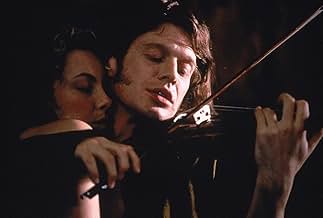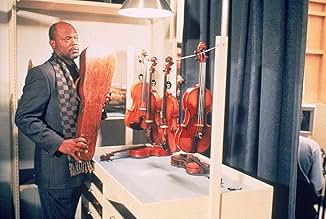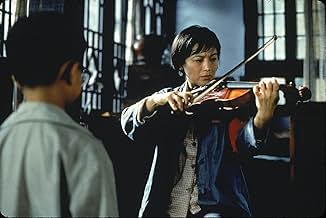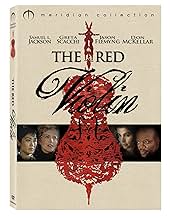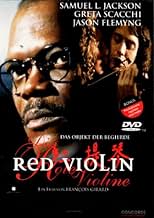CALIFICACIÓN DE IMDb
7.6/10
35 k
TU CALIFICACIÓN
Un violín rojo inspira pasión, viaja a través de tres siglos de varios propietarios y países, y finalmente termina en una subasta donde puede encontrar un nuevo dueño.Un violín rojo inspira pasión, viaja a través de tres siglos de varios propietarios y países, y finalmente termina en una subasta donde puede encontrar un nuevo dueño.Un violín rojo inspira pasión, viaja a través de tres siglos de varios propietarios y países, y finalmente termina en una subasta donde puede encontrar un nuevo dueño.
- Dirección
- Guionistas
- Elenco
- Ganó 1 premio Óscar
- 20 premios ganados y 19 nominaciones en total
- Dirección
- Guionistas
- Todo el elenco y el equipo
- Producción, taquilla y más en IMDbPro
Opiniones destacadas
I was captivated from the moment the film started. The music flowed effortlessly and the scene was set immediately.
Some people may be put off by the use of foreign language and subtitles early on in the film but I found this served to enhance the story and grab my attention even more. It reminds you of the true beauty of language and music and no matter what your taste you cannot help but to be drawn into the story.
The story follows the journey of the Red Violin from its creation and you really feel that something special is happening from the way the red violin is revered. The different people who come into contact with the instrument all have there own stories and you find yourself trying to guess how the Violin will affect them. Sometimes you are right and sometimes not.
Francois Girard has produced a wonderful film and the original score enhances this. This film is one that I will watch again and again and one that should be highly recommended.
Some people may be put off by the use of foreign language and subtitles early on in the film but I found this served to enhance the story and grab my attention even more. It reminds you of the true beauty of language and music and no matter what your taste you cannot help but to be drawn into the story.
The story follows the journey of the Red Violin from its creation and you really feel that something special is happening from the way the red violin is revered. The different people who come into contact with the instrument all have there own stories and you find yourself trying to guess how the Violin will affect them. Sometimes you are right and sometimes not.
Francois Girard has produced a wonderful film and the original score enhances this. This film is one that I will watch again and again and one that should be highly recommended.
I saw this film the same day it came highly recommended to me by a coffee shop friend who couldn't stop gushing about it. While this guy is also a member of the Academy and has steered me to some pretty good picks in the past, I walked into the theater fearing the usual letdown that invariably follows going into a film with overly high expectations (i.e. The English Patient, The Truman Show, etc.) This film not only managed to exceed my expectations, it restored my faith in the magic and mystery of cinema altogether.
We start with a rather simple but cleverly structured story about a very unique red violin that emblematically (and quite literally for that matter) takes on the heart and fate of a 16th century Italian woman as it passes across several centuries and continents on its way to the auction block in present day Montreal. The unfolding vignettes reveal more and more about the nature of this instrument and, when strung together in the bigger picture, play out like finely orchestrated movements of a great sonata; each movement plucking out its own stirring and poignant variation on theme. I was so swept up in the majesty and spectacle of this film that it didn't even occur to me until much later that the violin is nothing less than a personification of beauty itself (okay, okay, maybe I'm starting to overly deconstruct things here in retrospect, but the parallels are too perfect to remain unexplored). It's fascinating to watch both the transformative and destructive power of this beauty as it's placed into the hands of a sensitive young boy, a self absorbed musical protege, and a remorseful ring leader of a totalitarian regime. Much praise goes to director Francois Girard in how he refrained from overplaying the social and moral commentary, repeating this theme at mostly an emotional level rather than an intellectual one -- much in the same way that beauty itself, to some degree anyway, defies analytical discussion and belongs in the realm of pure and simple experience. You obviously can't dissect it, as co-writer Don McKellar¹s onscreen character thought to do, and so it remains as it was in it's original form: timeless, magical, elusive. The stuff that pompous nobility and rich collectors the world over will offer a king's ransom for and still never manage to posses in the end.
Performances were good to great all around. It's hard to go wrong with Samuel L. Jackson in a leading role and I appreciated the fact that the actors actually appeared to be playing the violin on camera, as opposed to watching the typical hokey cutaways and cheat shots often associated with onscreen musical performances; nauseating contrivances that always tear down the wall of suspended disbelief with a resounding crash. The costuming, set design and cinematography were absolutely stunning (Oscar nominations soon to follow I'm sure) without taking center stage from the story. I especially loved the amazing period recreations of China and Austria. I felt like I was fully transported in both space and time to these places and walking among people who really belonged there.
Overall I would rate this one as a true film classic on the level of masterpiece. Perhaps this is in part due to my love for music and the undeniable fact that, being the sentimental guy that I am, I'm always a sucker for haunting open-ended films like this where you leave the theater in a half daze, pondering all the implications, mesmerized by the lingering imagery. I'm still speculating about the future of Mr. Moritz and what will ultimately happen when beauty is placed into the hands of our modern world.
We start with a rather simple but cleverly structured story about a very unique red violin that emblematically (and quite literally for that matter) takes on the heart and fate of a 16th century Italian woman as it passes across several centuries and continents on its way to the auction block in present day Montreal. The unfolding vignettes reveal more and more about the nature of this instrument and, when strung together in the bigger picture, play out like finely orchestrated movements of a great sonata; each movement plucking out its own stirring and poignant variation on theme. I was so swept up in the majesty and spectacle of this film that it didn't even occur to me until much later that the violin is nothing less than a personification of beauty itself (okay, okay, maybe I'm starting to overly deconstruct things here in retrospect, but the parallels are too perfect to remain unexplored). It's fascinating to watch both the transformative and destructive power of this beauty as it's placed into the hands of a sensitive young boy, a self absorbed musical protege, and a remorseful ring leader of a totalitarian regime. Much praise goes to director Francois Girard in how he refrained from overplaying the social and moral commentary, repeating this theme at mostly an emotional level rather than an intellectual one -- much in the same way that beauty itself, to some degree anyway, defies analytical discussion and belongs in the realm of pure and simple experience. You obviously can't dissect it, as co-writer Don McKellar¹s onscreen character thought to do, and so it remains as it was in it's original form: timeless, magical, elusive. The stuff that pompous nobility and rich collectors the world over will offer a king's ransom for and still never manage to posses in the end.
Performances were good to great all around. It's hard to go wrong with Samuel L. Jackson in a leading role and I appreciated the fact that the actors actually appeared to be playing the violin on camera, as opposed to watching the typical hokey cutaways and cheat shots often associated with onscreen musical performances; nauseating contrivances that always tear down the wall of suspended disbelief with a resounding crash. The costuming, set design and cinematography were absolutely stunning (Oscar nominations soon to follow I'm sure) without taking center stage from the story. I especially loved the amazing period recreations of China and Austria. I felt like I was fully transported in both space and time to these places and walking among people who really belonged there.
Overall I would rate this one as a true film classic on the level of masterpiece. Perhaps this is in part due to my love for music and the undeniable fact that, being the sentimental guy that I am, I'm always a sucker for haunting open-ended films like this where you leave the theater in a half daze, pondering all the implications, mesmerized by the lingering imagery. I'm still speculating about the future of Mr. Moritz and what will ultimately happen when beauty is placed into the hands of our modern world.
Literally spanning centuries to unfold its mesmerizing tale, The Red Violin traces the unbelievable history of an acoustically flawless masterpiece crafted in the late 1600s by an Italian master. Co-screenwriters Francois Girard (who directed) and Don McKellar (who acts in the film) structure the movie around a wealth of richly detailed locales, including Vienna, China, and Oxford, and provide a unique modern-day Montreal framework which intertwines with the often tragic history of the instrument to provide the narrative with a rather unique element of mystery. The late-19th century English section shows the film at its most baroque, but each of the finely tuned tales reaches for some truth about music, life, love, and passion -- and that is commendable. Music lovers take note: the sounds that come out of the crimson treasure throughout the course of its journey are utterly thrilling and inspiring.
9T-10
What can you say about a film that covers three centuries, people from all stations of society, and several European countries and Canada. Ambitious is a good start. This film was very well crafted and at about one hundred forty minutes was too short for me. The story follows a red violin, an inanimate object, although at times it seemed alive to me, thru three centuries and the influences good and ill that it has on its possessors. It does ever seem to be owned. Each of its possessors lives a life of passion and turmoil. The violin's birth is during turmoil and during its life it buried, shot, and almost burned. The writing which includes this parallel between the violin and its possessor , five somewhat independent segments that mell and converge in the final scenes, and a story told by tarot cards make for an extremely unique experience. Add to that the musical score, scenery, the varied languages and cultures and you have a great offering. The performances were all strong, but I thought Jason Flemyng as Lord Frederick Pope stood out. To say his character was eccentric and maybe a little over the top is justifiable but I'm sure that was intended. English nobility has always been known for its idiosyncrasies. The ending has incongruous feel with the remainder of the film but is satisfactory and I can not suggest a better one. Great entertainment! Three and a half stars!!!
I had never heard of this movie until I heard about it on the radio. I listen to classical music, and the staion was praising Joshua Bell (an ohio native) on his perfomance of the music. I was curious and saw it when it came on video. not only did i fall in love with the movie itself, but also the music. it was soothing, passionate, and brutal all at the same time. Many people I have talked to have said that Le Violon Rouge was just some crappy indie movie. However, the music is as beautiful as the plot. The storyline and the way it was presented in the form of different people who wanted the violin for different reasons was not so much genius, but different and fitting.
¿Sabías que…?
- TriviaChristoph Koncz (as Kaspar Weiss the orphan virtuoso) was only nine years old when featured in this movie. He is an Austrian-Hungarian classical musician that became an internationally-renowned violinist and conductor.
- ErroresThe substance used to give the violin its color would not actually work in real life. The substance does not mix into varnish, and would quickly coagulate and oxidize to a dark brown or black color if it were actually used as the movie implies.
- Citas
Charles Morritz: What do you do when the thing you most wanted, so perfect, just comes?
- Bandas sonorasO Richard! O mon Roi!
from "Richard Coeur de Lion"
Composed by André-Modeste Grétry
Selecciones populares
Inicia sesión para calificar y agrega a la lista de videos para obtener recomendaciones personalizadas
Detalles
- Fecha de lanzamiento
- Países de origen
- Idiomas
- También se conoce como
- The Red Violin
- Locaciones de filmación
- Productoras
- Ver más créditos de la compañía en IMDbPro
Taquilla
- Presupuesto
- USD 18,000,000 (estimado)
- Total en EE. UU. y Canadá
- USD 10,019,109
- Fin de semana de estreno en EE. UU. y Canadá
- USD 47,415
- 8 nov 1998
- Total a nivel mundial
- USD 10,019,109
- Tiempo de ejecución
- 2h 10min(130 min)
- Color
- Mezcla de sonido
- Relación de aspecto
- 1.85 : 1
Contribuir a esta página
Sugiere una edición o agrega el contenido que falta


